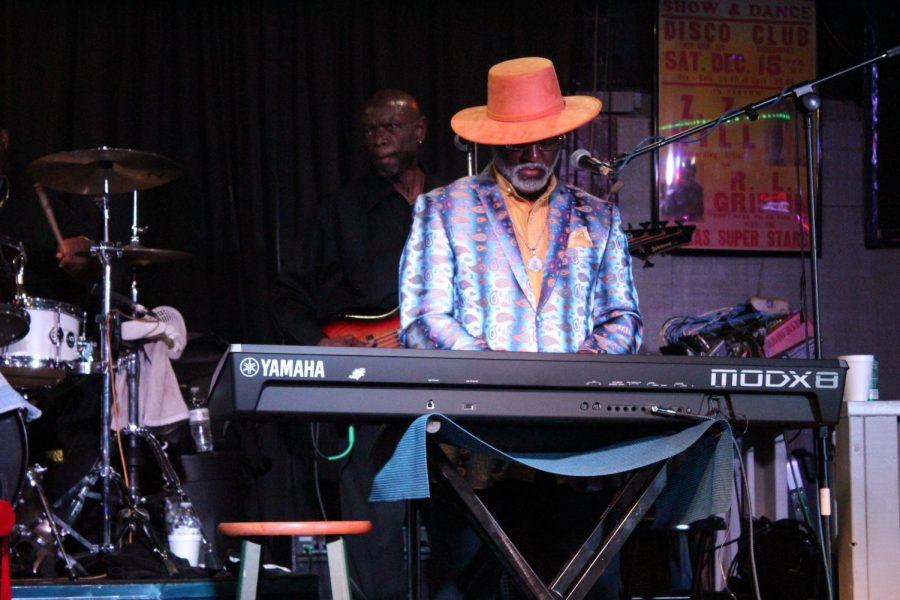South Dallas blues club survives pandemic hurdles
September 2, 2021
R.L. Blues Palace II reopened March 12. Attendees could feel the excitement in the air. The Blues Palace has been active since 1985, but was forced to close its doors because of the pandemic. The lively place that was open on weekends with live blues and dancing came to a grinding halt.
It is just a few minutes after 8 p.m. at 3100 Grand Ave. and the parking lot is already filling up as patrons – many grinning ear to ear – start arriving at R.L. Blues Palace II in South Dallas. The house DJ spins music inside while mostly older couples enter the venue dressed to the nines in their Sunday best.
At 10 p.m. the seven-piece house band started. After a solid set to warm up the crowd, the main attraction was introduced. Blues legend R.L. Griffin entered. Smiling, he asked the crowd, “Are you ready? Are you ready?”
Dressed in an eye-catching red-and-black windowpane blazer and a black hat, Griffin said, “I can’t hear you.” The band followed Griffin’s cues and the septet started with “Land of 1000 Dances.” The packed dance floor swayed and sashayed.
Once a pleasant offering of Griffin’s vocals was enjoyed by the crowd, he invited his son Alan Turner, affectionately known as Fat Daddy, to sing with the band.
“If you are sexy and you know it, come to the front,” Fat Daddy said to the crowd. Those feeling sexy followed his instructions and soon the dance floor moved in satisfaction as Fat Daddy welcomed them with his warm vocals and engaging performance.
R.L. Blues Palace is family owned and operated. Griffin’s oldest son, Ray Turner, runs the front door. Griffin’s son Adrian Turner, professionally known as DJ Magic, DJs at the venue for concerts and special events. Fat Daddy is an up-and-coming musician. He has a fraternal twin brother, Alton Turner, who has pursued the financial side of entertainment. Each of the Griffin sons play an important role in the family music and business.
In a September 2013 Dallas Observer article, Kiernan Maletsky described when Griffin’s first club, Blues Alley, opened in 1985 and was forced to change its name after receiving a legal request from a Washington, D.C., club. He changed the name to R.L. Blues Palace. By 1999, the venue outgrew the space and Griffin took over an old barbecue joint across the street and transformed it into R.L. Blues Palace II.
March 12 marked a year since the COVID-19 shutdowns affected R.L. Blues Palace. “That is the first time we have ever been closed that long since being in business,” Adrian Turner said.
The family owns the building and kept all bills paid throughout the pandemic including renewing an unusable dance hall license, a certificate of occupancy, the beer and wine license as well as paying the music band during the pandemic.
Prior to the pandemic, their secret to staying in business and developing a loyal following was simple: provide audiences with the most talented live music performances by blues musicians in the Dallas-Fort Worth area. “We give them a full show,” Adrian said. “A full atmosphere.”
The atmosphere inside R.L. Blues Palace is nostalgic. Club goers dress up in their finest suits, fedora hats and show-stopping dresses transforming back into the era of Robert Johnson and B.B. King. Adrian said, “We kept the recipe the same. We are not trying to change the format.”
Today palace goers have a nearly identical experience to a night on the dancefloor back at the original Blues Palace in 1985.
Pete Freedman of Central Track, a news and media website, said: “That R.L. has been able to exist for so long as an island largely unto itself is beyond remarkable; it’s historic. Its significance as a hub for South Dallas and Black musicianship, not to mention its position as one of the last great regional juke joints, cannot be overstated.” The venue won the Dallas Observer’s Best Blues Bar in 2014.
The recipe may be the same, but the venue has made a few changes to comply with Centers for Disease Control and Prevention guidelines to protect patrons.
To give regulars that consistency safely, the venue is screening temperatures and requesting patrons wear a mask. Adrian said, “There are no new faces, everyone feels like they know each other, everyone mixes and mingles.” The age limit is not posted, but the venue prefers a 23 and up demographic.
Adrian said, “We are a BYOB establishment; you bring in what you can handle.” He said, “The average patron brings in exactly what they need to have a good time and not get out of control.”


